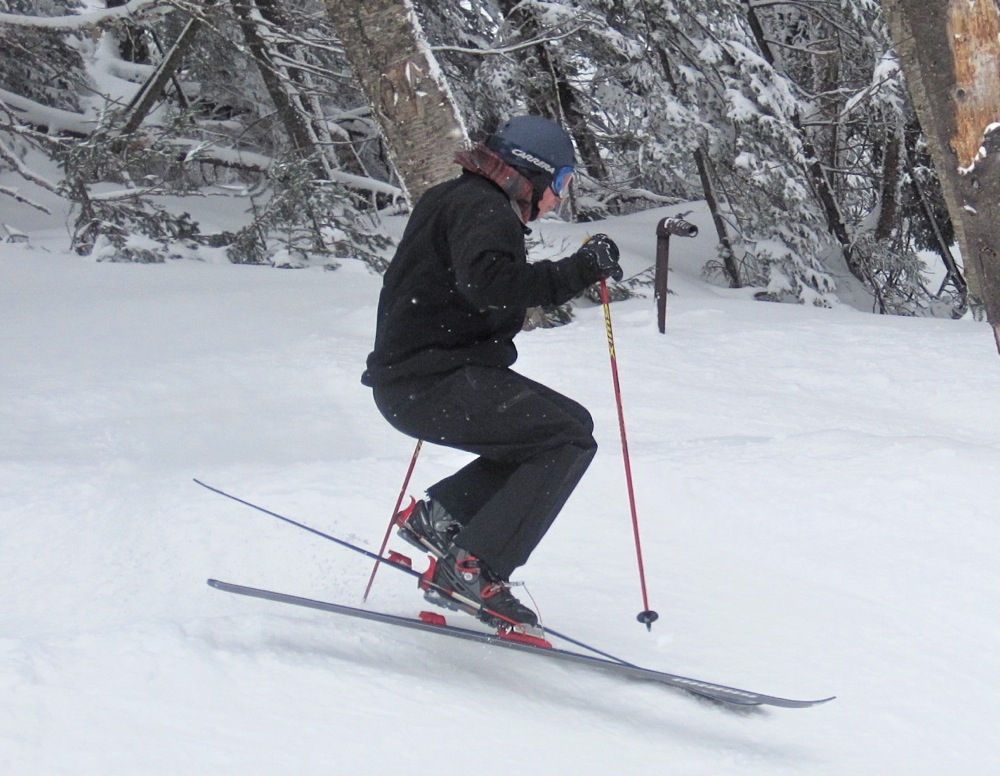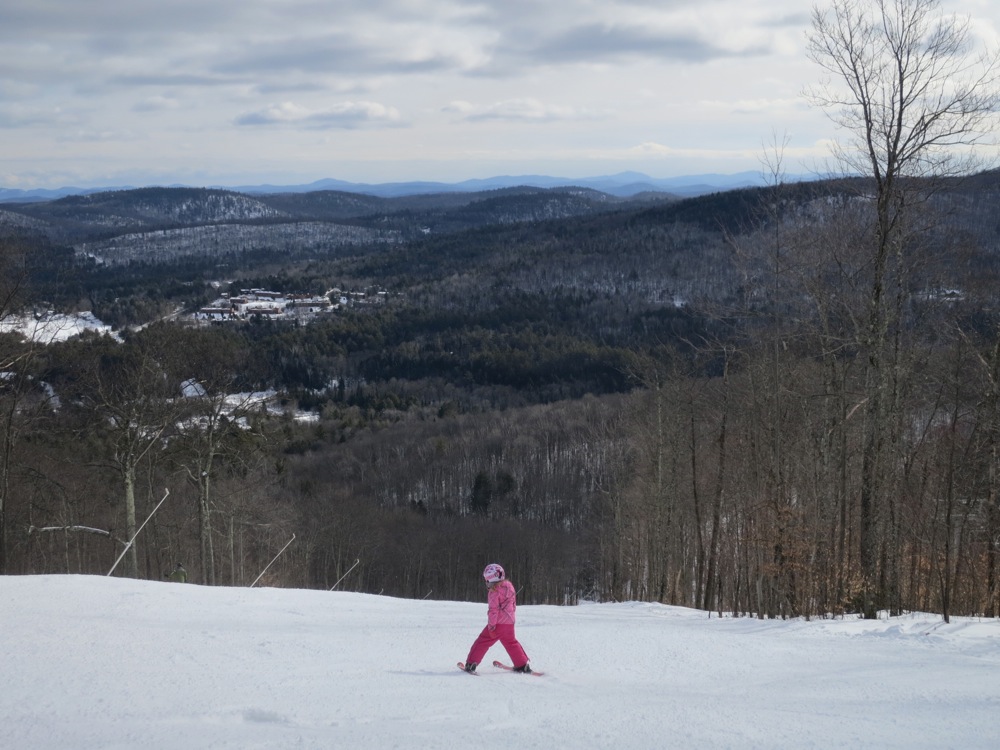I started alpine skiing in 1999 at age 40 and early on I wanted to be an expert. I wasn’t sure what defined an expert other than a vague idea about being able to “ski anything.” What is an expert skier?
I recently skied with my six-year-old for the first time on a black rated trail. Gore’s Sagamore is essentially a long blue trail with two black pitches. Skiing it doesn’t make my daughter an expert. She’s an advanced beginner who skied expert terrain. Expert status is about how you get down not what you get down.
I did a little research and found a definition: “Expert skiers are adept at handling varied terrain and different snow conditions. The terrain may include steeps, trees, and moguls, or a combination of the three. Snow conditions might include hard pack, ice, crud, or powder, as well as groomed or ungroomed snow. Expert skiing requires quick adjustments to speed, turn radius, and balance to maintain control at all times.”
The first part of this definition leaves me unsatisfied. While true, it’s not helpful. It might as well say “adept on all terrain” and be done with it. What I’m after is a clear understanding of the mechanics of “adept” skiing. The second part — the definition of expert skiing — comes a little closer to providing the information I’m after.
When I started lift-served skiing, my ski partner was a local, so he skied a lot and improved quickly. Soon he was taking runs on the Gore’s black terrain on the summit leaving me to my green and blue laps down below. One day he came back down and said, oh yea, dude, you could ski up there.
As my gear got burlier, I got braver, and then one day in March, it dumped 20 inches of beautiful, skiable snow. I went to the top and skied all the single blacks. I even skied some trees. Under the right conditions steep terrain is less difficult and more fun.
Each year since I started skiing, I’ve felt that I improved as a skier, getting closer to expert status each season. Until last year. I really didn’t ski well last season and in the end, it caught up to me. Not intended as an excuse, last season’s marginal conditions, really didn’t allow me to get into my groove, and practice good skiing. When I’m not skiing well, it’s usually because my head and hands are back. It tilts my body back and throws everything else off. This is caused by fear of commitment to the fall line.
Here’s my attempt to add to the definition of an expert skier: “Adeptness” comes from being in balance. When you’re balanced, you can practice, learn and use efficient body movements to quickly adapt in changes in terrain. You can’t practice or learn precise and efficient body movement until you are in balance. When you become an expert you’ll use less energy to ski the same terrain as intermediates.
My own corollary: Good or great conditions allow us to put our fears aside and commit to the fall line. Skiing good snow helps you become a better skier. And when you ski good snow, what you learn is actually transferable to more marginal conditions. For me, it’s hard to remember instructional advice when I’m attacking challenging terrain.
My friend Riverc0il is a great skier and a quick study with an analytic mind. He gave me one tip: “Uncle Tony Knows.” It’s designed to be a simple reminder. Keep Toes, Knees and Nose (Tony Knows) vertically aligned to stay in balance. That position allows you to make quick adjustments without using too much energy. It’s really helped me this year and I think I’m back on track. Maybe I’d add one thing to it: “Uncle Tony Knows, Ski Soft Snow.”




expert skier = skier who has the most fun!!
Harvey,
Wow, I could have written this article and it fits me nearly perfectly (the part about having children does not fit, my wife and I have none). I consider myself a competent skier but the word expert does not pop into mind immediately. I handle most of the runs on the WI-MI (Yooper) hills I ski.
Sometimes it feels like I am the commander of the runs (commander of the runs, carver of the slopes — sing it!) and other days I feel like such a dork on skis. Last weekend I was skiing with camera in one hand and poles in the other, and was really skiing well, but the conditions were bluebird and the runs were well domesticated by groomers.
I am striving to become an expert too. I am approaching that through balanced fitness (weight loss, strength, cardiovascular fitness, balance, and flexibility are all considerations when I work out), and I watch and read a lot on technique. My brother last weekend noted positive changes in my skiing that my posture and skiing were definitely showing signs of moving along.
When I workout (on a stationary bike or elliptical) I often pull out my phone and watch a video of a guy skiing down Birds of Prey. He is taking a fairly straight line, carving back and forth tight on the fall line, poles in one hand, and camera in the other. I watch that and tell myself that will be me someday. You know what, when (and if) it is me I will probably still be wondering what it means to be an expert skier. When you are traveling you stop when you reach your destination, no? I think the idea we share is reaching an impossible goal and in doing so we are able to keep improving.
Also, as you note, good skiing (once you get the basics down) is more of a mental thing, if you are confident your shins are in the tongues of your boots and if not then you may be more weight back.
Enjoy this luscious spring skiing we have, remember WINTER OWES US ONE!
I agree with most of the you wrote above particularly the part about an expert being more efficient than an intermediate or advanced skier on the same terrain. An expert has the ability to modify the 3 skiing skills while maintaining in dynamic balance and use tactics to suit the varying conditions not just from run to run but turn to turn as needed.
Harvey, What a timely post…
Last week I met somebody that told me skiing was their passion.
Always happy to meet a likeminded person,
I excitedly asked are you an expert?
he replied “super expert”
I never heard that term b4.
so,
I said I love the trees and bumps, and strive to become an advanced intermediate.
I would love to get out there with you!
he said he didn’t ski trees or bumps.
Then said he had not skied this year.
needless to say I was a little bummed.
To each his own…
To paraphrase Justice Stewart: It is hard to define on paper (or the internet)….but I know it when I see it!
People who can ski down expert terrain are a dime a dozen. Lots of people are looking for a notch in the belt, or something to brag about, or maybe just an endorphin rush. True experts don’t need to be on challenging terrain to prove their skills….you can tell watching them cruise Sunway.
And I always remind my kids that they are not really an expert skier if they can’t carry their all their gear from the car to the lodge. Or if they need me to buckle their boots.
I am NOT an expert telemark skier, though one might say I have expert skills as an alpine skier. The balance thing makes complete sense and it is easy for me to be balanced on alpine skis, with weight forward, shins pressed against the tongues of my boots. But on tele’s we don’t have that luxury and I find the for/aft balance is very hard to achieve. How do telemarkers keep their weight forward, stay balanced and in control?
As applied to the word adept in the first definition the second definition is pretty good. Notice that expert skiing does not mean the ability to ski any terrain under any condition, there are some conditions and terrain which an expert skiier would simply not ski, it is thier expertise that would let them know it is not safe and they would be smart enough to avoid – like our recent snowboarder at Bridger.
Ha! Super expert. That’s good. I’ll have to use that…
When determining whether someone is an expert, I generally use something similar to the PSIA Level 3 skiing standards (google it). It contains things like:
• Ski dynamic parallel turns on any terrain on [all] mountains
• …Consistently maintain the balanced relationship of the hips and feet through all phases of the turn
• Utilize proactive movements which anticipate ski reaction and create balance adjustments…
• Reduce, generate, or maintain speed without interrupting overall flow and rhythm
That’s just a sample. The whole list is pretty well done. You can go through the whole thing and check off what you are able to do and what you need to work on.
S.Jack is correct, It’s all about the smiles. Everything else is just mechanics.
This is a great topic. I have always assumed I am a middle of the road 8 but I feel I fluctuate within that 8. I went out to Belle yesterday and had an ok day. Visibility was bad. (20 mph wind and heavy snow) and the foot of snow that fell was on the heavy side. Right from the get-go I was in a tentative mind-set and really had to work to stay centered. I just didn’t feel right. Fast forward to this morning and I read this post before going out. I watched a couple of the PSIA lvl 3 videos and realized that my problem was all mental. I had no aggression whatsoever, I was tentative. I went out today with a different attitude and felt like I skied really well. I know I will never be a 9 because I don’t have the fitness level or fast twitch muscle that I did 30 years ago but I am still capable of skiing variable conditions dynamically for short periods of time. Advanced yes, Expert no. It just amazed me how important the mental attitude is in making a difference in how well I ski.
Chris,
I agree an aggressive mindset is so important, holding back makes it harder and my experience suggests makes skiing in some circumstances more dangerous.
I know I will never achieve expert status {age knee injuries too tentative} I may not look pretty on tough terrain However when I ski them I follow the fall line and I don’t plug the trail up by standing around or traversing the hill.
Very well written piece.
I like very much the “Uncle Tony Knows” reminder.
We’re as good as we think we are…until one day, one trail on one mountain reminds us to be humble.
I can ski all kind of snow, deep powder, steep slopes, hard packs, ice packs, cliffs, etc… but I’m not good using carving technique in spite of I use carving skis… I can make carving turns but usually I use my natural way to skiing from I was 8 years old 40 years ago.
I was ten years with no practice of skiing right when the carving techniques was developing more a nd more, then I started to ski 5 years ago.
Am I expert skier? or just not good because I’m not good in carving turns?
I think expert is skier who is able to ski relaxed and controled with correct technique for every snow conditions, or any steep slope, or cliff, using a correct base position, using poles correctly, and using or skidding or carving correctly, it does not matter if the person do carving or not.
It varies so much though. I wouldn’t consider someone an expert until they were progressed past piste and pushing into natural content. A time period also works fairly well, 10,000 hours of practice to master a skill plays out rather realistically is a great many fields. Many people skiing at jow-blow’s 600 vert hill in indiana might be considered expert in their element, but get them to a big mountain and things change.
In the end it strikes me that the easiest answer may be self-reflective. If you can ski the terrain that you want to ski, with skill/control that you are satisfied with, you are an expert (in what you do). But, of course, there is always room to improve!